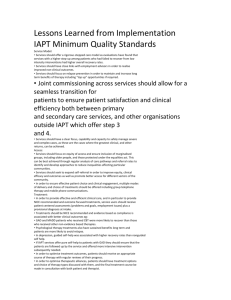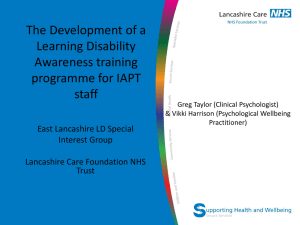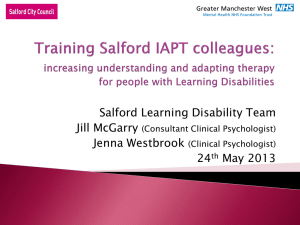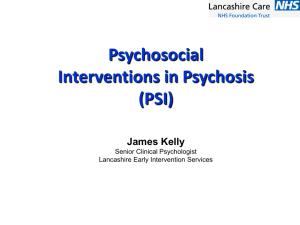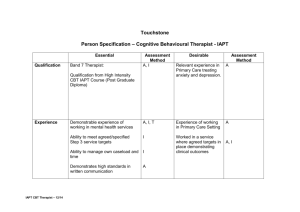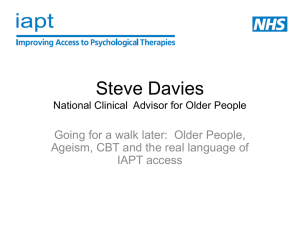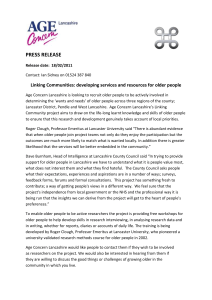- iapt.nhs.uk
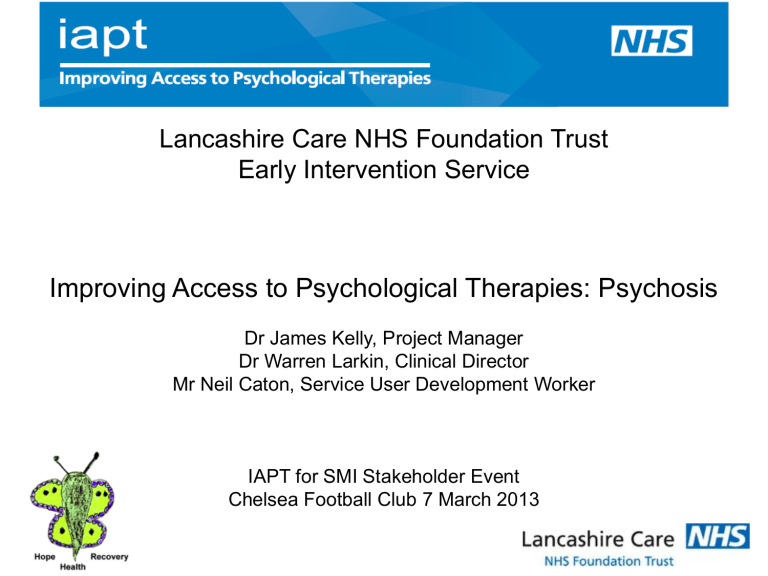
Lancashire Care NHS Foundation Trust
Early Intervention Service
Improving Access to Psychological Therapies: Psychosis
Dr James Kelly, Project Manager
Dr Warren Larkin, Clinical Director
Mr Neil Caton, Service User Development Worker
IAPT for SMI Stakeholder Event
Chelsea Football Club 7 March 2013
Lancashire Early Intervention Service
Lancashire EIS Catchment Area
Catchment population 1.3 million – 773 current service users
What Can Lancashire EIS Share?
Whole Service Ethos of Psychosocial Care
• Matched care or tiered approach to delivering psychological care across whole workforce
Education & Training
•
PSI Training: All of our staff are trained in CBT-informed interventions (manualised, effective and accredited)
• Behavioural Family Therapy: We have 20+ staff trained and have our own BFT trainers
• CBT & CBFI: Cohort of staff trained to Masters & Diploma level
• REaCh: Routine Enquiry about Childhood Adversity
Psychosocial Interventions Training
5
4
3
2
Baseline Post training
6 month
Knowledge
Confidence
Application
A Matched-Care / Tiered Approach to Psychological Care
Psychosocial interventions
Tier 1
Specific PSI Training
Supervision/ Consultation
Case managers/
ST&R
Formal CBT or
FI,
Discrete
Problems
Tier 2
Staff with:
Formal CBT training or COPE
Msc (under supervision )
Complex / multiple problems longer term CBT or FI
Tier 3
Cognitive
Therapists
Clinical
Psychologists
Phase 1:
Solid Foundations for Demonstrating IAPT in SMI
Service User Engagement
Developing sustainable and consistent SU partnership
Service Delivery
Mobile solutions – efficient use of valuable Therapist time
Recruitment 2 therapists and Admin Assistant.
Service Evaluation
Assessed the feasibility of IAPT data set in Lancashire EI Service
Preliminary Data
Dissemination
Radio 5 live, positive local media coverage on Demo Site
North West IAPT Collaborative
Electronic Care Record & Mobile Application
• PROMS Forms built and available on the existing electronic care record
• Contacts planned in electronic care record generate work list in therapist diary on the mobile device
• PROMS forms available on mobile device can be completed by service users and / or practitioners
• We are in the 1 st phase of software development.
• Through an agile approach further functionality will be developed during 2013
Choice
Service User Experience & Involvement
• Childhood and teenage adversity
• Experiences of psychosis
• Lancashire EIS intervention
• Service User Development Strategy
Phase 2:
What we will do next
Service User Engagement
• Establish Service User Development Officer post
• A collaborative approach to service development…
Service Delivery
• Improve access to NICE compliant CBT and FI
• Improve access to therapist support for Tier 1 PSI work throughout the system.
• Refine and improve staff training at all levels in line with identified psychosis competencies.
Phase 2:
What we will do next
Service Evaluation
• Systematic Data Collection with new cohort of SU ’ s
• Refine and develop Electronic Care Record and mobile device solutions
Dissemination
• Engagement workshops with Clinical Commissioning Groups in
Spring
• Planning a large scale event 4 th June & update events to report progress Winter 2013
• Bespoke workshops with NHS and other organisations
Data Completion
Emergency Community Contacts
Occupied Bed Days
Challenges
• Developing IT systems alongside significant IAPT
CAMHS project.
• Difficulty in recruiting therapists to 1 year posts.
• Sessional measurement a culture change to existing clients and to therapists.
Weekly monitoring improved rates.
• Influencing wider system
Conclusions
• Access to Psychological Therapies within SMI is inadequate across NHS
• We need to train more staff to deliver high quality
Psychological Therapies in SMI
• Initial experience is that regular measurement of outcomes is possible in psychosis SU group
• Innovative use of technology can enhance efficiency and
SU engagement
• Improving access in a changing NHS is possible through innovation and practice change
